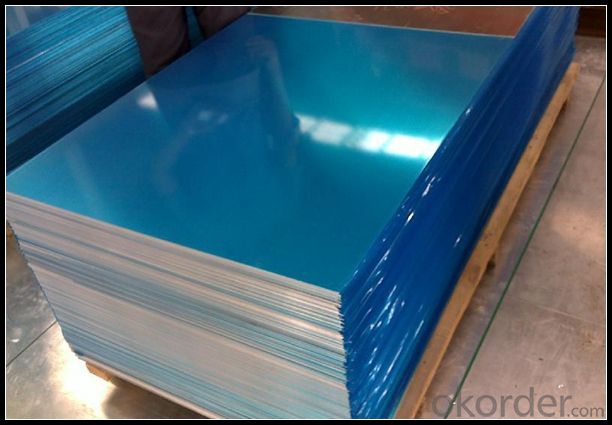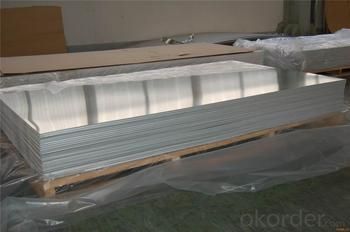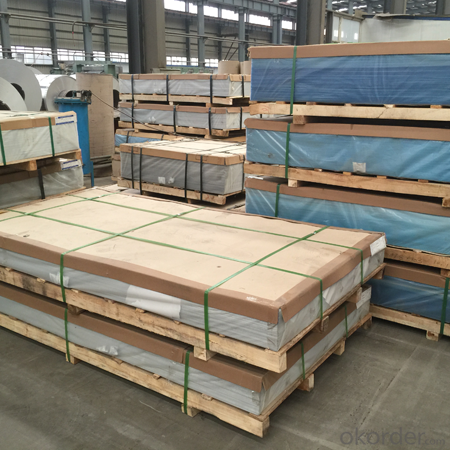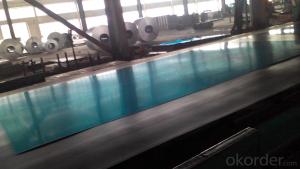EN AW - 2219 Aluminium Sheet With Transparent PE Film
- Loading Port:
- Shanghai
- Payment Terms:
- TT OR LC
- Min Order Qty:
- 5 m.t.
- Supply Capability:
- 1000 m.t./month
OKorder Service Pledge
OKorder Financial Service
You Might Also Like
Item specifice
1. Structure of EN AW - 2219 Aluminium Sheet With Transparent PE Film Description
EN AW - 2219 Aluminium Sheet With Transparent PE Film is one semi-finished aluminium material. This sheet can be rolled down to aluminium coil,sheet,circle ect. The alloy AA1050 is widly used in building, industry ect. Its weight is much lower than steel. So many customers choosed aluminium material instead of steel.
2. Specification of EN AW - 2219 Aluminium Sheet With Transparent PE Film
EN AW - 2219 Aluminium Sheet With Transparent PE Film | |
Main Specification | |
Alloy | AA1xxx (AA1050, AA1060, AA1070, AA1100 etc.) |
AA3xxx (AA3003, AA3004, AA3005, AA3105 etc.) | |
AA5xxx, AA6XXX (AA5052,AA5083, AA5754, AA6061, AA6062 etc.) | |
AA8xxx(AA8011, AA8006 etc.) | |
Temper | H14,H16, H18, H22, H24, H26, H32,O/F, T4, T6, T651 |
Thickmess | 0.01mm-100mm |
Width | 30mm-1700mm |
Standard | GB/T 3880-2006/ASTM |
Special specification is available on customer's requirement | |
3. Application of EN AW - 2219 Aluminium Sheet With Transparent PE Film
(1).Interior: wall cladding, ceilings, bathrooms, kitchens and balconies, shutters, doors...
(2).Exterior: wall cladding, facades, roofing, canopies, tunnels,column covers , renovations...
(3).Advertisement: display platforms, signboards, fascia, shop fronts...
4. Feature of EN AW - 2219 Aluminium Sheet With Transparent PE Film
Surfact Quality :
Be free from Oil Stain, Dent, Inclusion, Scratches, Stain, Oxide Dicoloration, Breaks, Corrosion, Roll Marks, Dirt Streaks and other defect which will interfere with use,
Mechenical Property:
Chemical Composite and Mechanical Property
5. Certificate of EN AW - 2219 Aluminium Sheet With Transparent PE Film
SGS and ROHS(if client request, paid by client), MTC(plant provided), Certificate of Origin(FORM A, FORM E, CO), Bureau Veritas and SGS (if client request, paid by client), CIQS certificate
6. Image of EN AW - 2219 Aluminium Sheet With Transparent PE Film



7. Package and shipping of EN AW - 2219 Aluminium Sheet With Transparent PE Film
First, plastic cloth with drying agent inside; Second, Pearl Wool ; Third, wooden cases with dry agent , fumigation wooden pallets, aluminum surface could cover blue PVC film
8. FAQ
1) What is the delivery time?
Depends on actual order, around 20 to 35 days
2) What is the QC system:
We have QC staff of 20 persons and advanced equipment, each production is with MTC traced from Aluminum ingot lot.
3) What market do you mainly sell to?
Australia, America, Asia, Middle East, Western Europe, Africa etc
- Q:How are aluminum coils used in the aerospace industry?
- Aluminum coils are extensively used in the aerospace industry for various applications. One of the primary uses of aluminum coils is in the construction of aircraft structures. Aluminum is a lightweight material with excellent strength-to-weight ratio, making it an ideal choice for the aerospace industry where weight reduction is crucial. These coils are often formed into sheets or plates and used to build aircraft fuselage, wings, and other structural components. In addition to structural applications, aluminum coils are also used in the manufacturing of heat exchangers and cooling systems in aircraft. Aluminum's high thermal conductivity and corrosion resistance make it an excellent material for dissipating heat generated by engines and electronic systems. The coils can be shaped into tubes or fins, allowing efficient heat transfer and ensuring optimal performance of the aircraft's cooling systems. Another important use of aluminum coils in the aerospace industry is for electrical applications. Aluminum is a good conductor of electricity, and its coils are used in the production of electrical wiring, connectors, and cables. These components are crucial for the proper functioning of various systems in an aircraft, including power distribution, communication, and navigation systems. Furthermore, aluminum coils are also employed in the construction of fuel tanks and hydraulic systems in aircraft. Aluminum's resistance to corrosion and its ability to withstand high pressure and temperature make it a reliable choice for these critical components. The coils can be shaped and welded to form tanks or piping systems that store and transport fuel and hydraulic fluids safely and efficiently. Overall, aluminum coils play a vital role in the aerospace industry by providing lightweight, strong, and corrosion-resistant materials for structural, thermal, electrical, and fluid management applications. Their versatility, durability, and excellent performance characteristics make them indispensable in the design and construction of modern aircraft, ensuring safety, efficiency, and reliability in air transportation.
- Q:What are the potential applications of coil-stucco aluminum coils?
- Coil-stucco aluminum coils possess distinctive properties and characteristics, resulting in a broad range of potential applications. Some of these applications include: 1. Building and construction: Within the construction industry, coil-stucco aluminum coils find widespread use for various purposes. They offer durability, versatility, and aesthetic appeal when employed in roofing, cladding, and siding applications. The stucco finish on the coils adds texture and enhances the overall appearance of buildings. 2. Transportation industry: The transportation industry also utilizes coil-stucco aluminum coils for the manufacturing of trailers, truck bodies, and other vehicles. Aluminum, being lightweight yet strong, proves to be an ideal material for reducing vehicle weight and increasing fuel efficiency. The stucco finish on the coils adds strength and resistance against scratches and abrasions. 3. Appliances and electronics: Coil-stucco aluminum coils are suitable for the manufacturing of appliances and electronics due to their corrosion resistance and thermal conductivity. Commonly found in refrigerators, air conditioning units, and other household appliances, aluminum coils are highly valued. The stucco finish provides an extra layer of protection against wear and tear. 4. Signage and advertising: The signage and advertising industry extensively employs coil-stucco aluminum coils for creating outdoor signs, billboards, and displays. The stucco finish reduces glare and reflections, enhancing the visibility of the signs. Moreover, aluminum's weather-resistant nature makes it an appropriate choice for outdoor applications. 5. Packaging industry: The packaging industry also finds applications for coil-stucco aluminum coils. Aluminum, being non-toxic and non-reactive, proves to be a suitable material for packaging food and beverages. The stucco finish adds an appealing texture to the packaging material, making it visually attractive. 6. Industrial applications: Coil-stucco aluminum coils are used in various industrial applications, including the manufacturing of equipment, storage tanks, and processing systems. Aluminum coils are preferred in industries where excellent corrosion resistance, high thermal conductivity, and strength are crucial. In conclusion, coil-stucco aluminum coils possess diverse and extensive potential applications. The unique properties of aluminum, combined with the stucco finish, make these coils suitable for a wide range of industries, including construction, transportation, appliances, signage, packaging, and industrial applications.
- Q:What is the composition of aluminum coils?
- Aluminum coils are typically composed of a pure aluminum core, which is surrounded by a protective coating or cladding material on both sides. The cladding material can vary and may include alloys such as aluminum-manganese, aluminum-magnesium, or aluminum-zinc, depending on the specific application and desired properties.
- Q:Aluminum reacts with water so why is it used in buildings and cooking??Some help by today would be good!! :DThanxx
- Aluminum reacts with water under certain conditions, but cookware does not usually present any of those conditions. Aluminum cookware takes advantage of the oxidizing process, which creates a natural protective layer over the aluminum. It doesn't react with water in the same way that chemical equations say it will because cooking surfaces are designed to maximize the oxidation effect. This is basically the same reason why aluminum foil doesn't react in water. In building materials, it's less about exposure to the elements and more about how cheap and lightweight it is. Many building materials are aluminum alloys, which makes them more susceptible to corrosion than purer aluminum, and the use of aluminium roofing material, though fairly corrosion-resistant by itself (for the same reasons as cookware), gets compromised by the proximity of other metals used in construction, like non-stainless steel nails and screws, for example, or copper pipes without insulation. The trade-off is that aluminium alloys hold their shape better and have greater tensile strength, some of which approach that of steel.
- Q:How does the gauge of aluminum coils affect their performance?
- The gauge of aluminum coils refers to the thickness of the aluminum sheet used to manufacture the coil. The gauge is typically measured in terms of its thickness, with a smaller gauge indicating a thicker sheet. The gauge of aluminum coils has a significant impact on their performance. Firstly, the gauge affects the strength and durability of the aluminum coil. Thicker gauges provide increased strength and resistance to bending or warping, making them suitable for applications that require robust and long-lasting coils. On the other hand, thinner gauges are more flexible but may be prone to damage or deformation, making them suitable for less demanding applications. Secondly, the gauge affects the thermal conductivity of the aluminum coil. Thicker gauges have lower thermal conductivity, meaning they are slower to heat up or cool down. This can be advantageous in certain applications where temperature control is crucial, as it helps to maintain a stable environment. Thinner gauges, on the other hand, have higher thermal conductivity, allowing for faster heat transfer. This can be beneficial in applications that require rapid heating or cooling. Thirdly, the gauge affects the weight and cost of the aluminum coil. Thicker gauges are heavier and generally more expensive due to the increased amount of material used. This can be a consideration in applications where weight or cost is a significant factor. Thinner gauges, being lighter and less expensive, can be more suitable for applications where weight reduction or cost efficiency is important. Lastly, the gauge affects the ease of fabrication and formability of the aluminum coil. Thinner gauges are more easily bent, shaped, or formed into desired configurations, making them suitable for applications that require intricate or complex designs. Thicker gauges, while less malleable, can still be formed but may require specialized equipment or processes. In conclusion, the gauge of aluminum coils has a direct impact on their performance. It affects their strength, durability, thermal conductivity, weight, cost, and formability. Therefore, selecting the appropriate gauge for a specific application is essential to ensure optimal performance and efficiency.
- Q:Are there any recycling programs for used aluminum coils?
- Indeed, recycling programs for used aluminum coils are readily accessible. Aluminum, being highly recyclable, can be melted down and repurposed without compromising its quality. Numerous recycling centers and scrap metal yards willingly accept aluminum coils for recycling purposes. Furthermore, certain HVAC companies, which frequently employ aluminum coils in air conditioning systems, have implemented their own recycling initiatives. It is advisable to consult your local recycling center or HVAC companies to obtain information regarding the specific recycling programs available for used aluminum coils in your vicinity.
- Q:Can aluminum coils be used in the production of chemical storage tanks?
- Yes, aluminum coils can be used in the production of chemical storage tanks. Aluminum is a versatile and durable material that offers several advantages for chemical storage applications. It is corrosion-resistant, which makes it suitable for storing a wide range of chemicals. Additionally, aluminum is lightweight, which makes it easier to transport and install compared to other materials like steel. It is also non-magnetic, which can be beneficial in certain applications. However, it is important to consider the specific requirements of the chemicals being stored and consult with experts or manufacturers to ensure that aluminum is the appropriate choice for the intended use.
- Q:Will aluminum foil go off in a metal detector
- No. I frequently wear my aluminum foil hat when going through metal detectors because I cannot risk losing contact with the transmitter on JRP-998 in the Andromeda Galaxy. The hat never sets off the alarm. I do.
- Q:How are aluminum coils joined in a continuous process?
- Aluminum coils are typically joined in a continuous process through a technique called welding, specifically a process known as continuous welding or continuous coil welding. This involves feeding the adjacent ends of the coils through a welding machine, which uses heat and pressure to fuse the metal together. This continuous welding process ensures a seamless and strong joint between the aluminum coils, allowing for efficient and uninterrupted production.
- Q:Can aluminum coils be used in solar panel installations?
- Indeed, solar panel installations can make use of aluminum coils. The lightweight properties, corrosion resistance, and remarkable thermal conductivity of aluminum make it a favored material for constructing solar panels. Frequently, aluminum coils are employed as the supportive backing material for solar panels, ensuring both structural stability and effective heat dissipation. Additionally, these coils are commonly utilized in the production of solar mounting systems, which securely hold the panels in position. All in all, aluminum coils present a dependable and efficient choice for solar panel installations.
1. Manufacturer Overview |
|
|---|---|
| Location | |
| Year Established | |
| Annual Output Value | |
| Main Markets | |
| Company Certifications | |
2. Manufacturer Certificates |
|
|---|---|
| a) Certification Name | |
| Range | |
| Reference | |
| Validity Period | |
3. Manufacturer Capability |
|
|---|---|
| a)Trade Capacity | |
| Nearest Port | |
| Export Percentage | |
| No.of Employees in Trade Department | |
| Language Spoken: | |
| b)Factory Information | |
| Factory Size: | |
| No. of Production Lines | |
| Contract Manufacturing | |
| Product Price Range | |
Send your message to us
EN AW - 2219 Aluminium Sheet With Transparent PE Film
- Loading Port:
- Shanghai
- Payment Terms:
- TT OR LC
- Min Order Qty:
- 5 m.t.
- Supply Capability:
- 1000 m.t./month
OKorder Service Pledge
OKorder Financial Service
Similar products
New products
Hot products
Related keywords






























